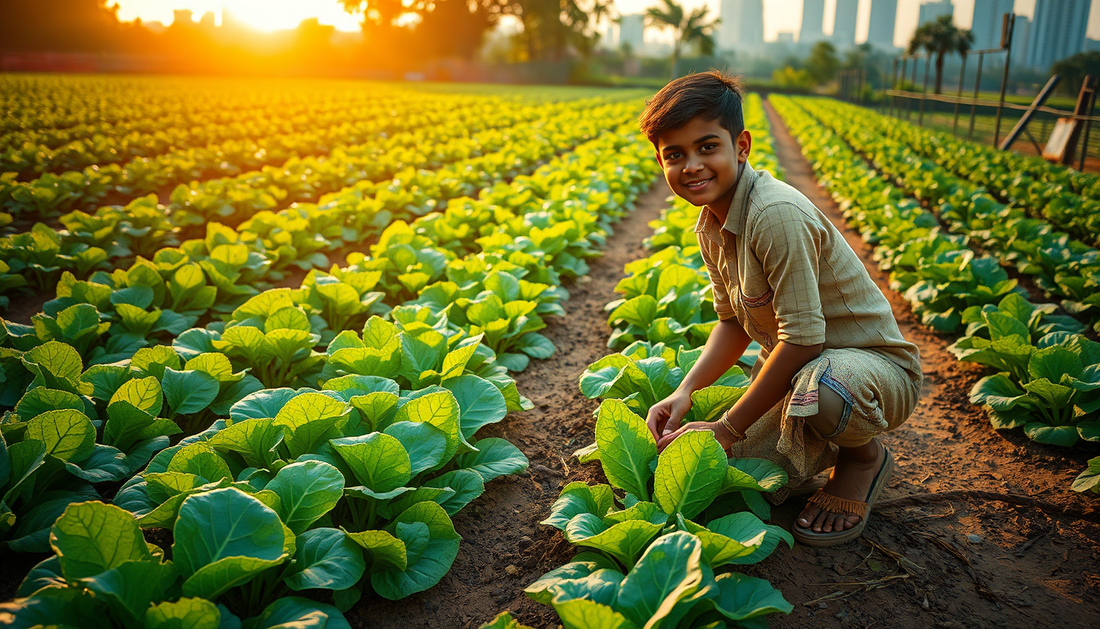
Spinach Gardening in Bangalore: A Beginner's Guide
Share
Spinach is a versatile and nutrient-dense leafy green that can thrive in the Bangalore climate, making it a popular choice for home gardeners. Whether you're a seasoned green thumb or a novice gardener, growing spinach in Bangalore can be a rewarding and satisfying experience. In this comprehensive guide, we'll explore the best practices for cultivating spinach in Bangalore, from soil preparation to harvesting, to help you enjoy a bountiful harvest.
Choosing the Right Spinach Variety
When it comes to growing spinach in Bangalore, the choice of variety is crucial. Some of the best-performing spinach varieties for the Bangalore climate include:
-
Malabar Spinach: Also known as Ceylon Spinach or Vine Spinach, this variety is well-suited to the warm and humid conditions of Bangalore. It can tolerate heat and partial shade, making it a versatile option.
-
New Zealand Spinach: This variety is more heat-tolerant than traditional spinach and can thrive in the Bangalore climate. It has a slightly different flavor profile but is still a nutritious and delectable option.
-
Savoy Spinach: This variety is known for its crinkly, textured leaves and is a popular choice for salads and sautés. Savoy spinach can handle the Bangalore heat better than some other spinach types.
When selecting your spinach seeds, look for varieties that are specifically labeled as suitable for warm-weather or tropical climates. This will ensure that your plants are well-equipped to handle the unique growing conditions in Bangalore.
Soil Preparation and Planting
Proper soil preparation is the foundation for a successful spinach harvest in Bangalore. Spinach prefers well-draining, nutrient-rich soil with a slightly acidic pH (between 6.0 and 7.0). To create the ideal growing medium, follow these steps:
-
Amend the Soil: Incorporate organic matter, such as compost or well-rotted manure, into the soil to improve its texture and nutrient content. This will provide the necessary nutrients for your spinach plants to thrive.
-
Raised Beds: Consider building raised garden beds, as this can help with drainage and prevent waterlogging, which can be a common issue in Bangalore's monsoon season.
-
Partial Shade: Spinach can tolerate partial shade, so choose a location that receives 4-6 hours of direct sunlight per day. This can help the plants cope with the intense heat.
-
Sowing and Spacing: Sow the spinach seeds about 1-2 inches apart and 1/2 inch deep. Thin the seedlings to 4-6 inches apart once they've established themselves.
-
Timing: In Bangalore, the best time to plant spinach is during the cooler months, typically from October to February. This will help the plants avoid the intense heat of the summer.
Watering and Fertilizing
Consistent and proper watering is crucial for growing healthy spinach in Bangalore. Follow these guidelines:
-
Frequency: Water your spinach plants regularly, keeping the soil moist but not waterlogged. During the hot and dry months, you may need to water more frequently.
-
Timing: Water in the morning or evening to minimize evaporation and ensure the plants have enough moisture throughout the day.
-
Fertilizing: Apply a balanced, water-soluble fertilizer every 2-3 weeks to provide the necessary nutrients for your spinach plants. Alternatively, you can use a slow-release organic fertilizer at the time of planting.
Pest and Disease Management
Bangalore's warm and humid climate can make spinach plants susceptible to various pests and diseases. To keep your spinach healthy, be on the lookout for the following issues and take appropriate action:
-
Aphids: These small, sap-sucking insects can quickly infest spinach plants. Use a strong stream of water or an insecticidal soap to remove them.
-
Leaf Miners: The larvae of these insects can create tunnels and trails within the leaves. Remove affected leaves and consider using a neem oil-based insecticide.
-
Downy Mildew: This fungal disease can cause yellowing and wilting of the leaves. Improve air circulation and use a fungicide if necessary.
-
Damping-Off: This soil-borne disease can cause seedlings to wilt and die. Ensure proper drainage and avoid overwatering to prevent this issue.
By staying vigilant and addressing any problems promptly, you can maintain a healthy and thriving spinach garden in Bangalore.
Harvesting and Storage
Spinach is a fast-growing crop, and you can start harvesting the leaves as soon as they reach a suitable size, typically 4-6 weeks after planting. Follow these tips for a bountiful harvest:
-
Harvesting: Gently snip the outer leaves, leaving the inner leaves to continue growing. This will allow for multiple harvests from the same plants.
-
Timing: Harvest spinach in the morning, when the leaves are crisp and turgid. Avoid harvesting during the heat of the day.
-
Storage: Store freshly harvested spinach in the refrigerator, wrapped in a damp paper towel or stored in a perforated plastic bag. This will help maintain freshness and crispness.
By following these guidelines, you can enjoy a steady supply of nutrient-rich spinach throughout the growing season in Bangalore.
Conclusion
Growing spinach in Bangalore can be a rewarding and delicious endeavor. By selecting the right varieties, preparing the soil, and providing the necessary care, you can cultivate a thriving spinach garden that will supply you with a bountiful harvest. Remember to stay vigilant for pests and diseases, and don't hesitate to adjust your gardening practices as needed to ensure the success of your spinach crop. With a little patience and attention, you can enjoy the fresh, flavorful, and nutritious spinach grown right in your own backyard.
